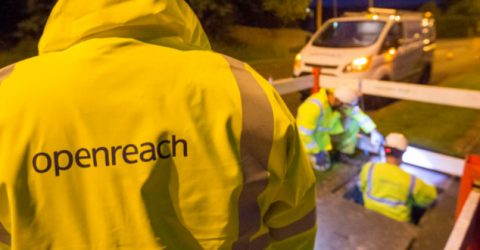Openreach plans full fibre for 3 million by 2020

Openreach has announced plans to connect three million premises to full fibre broadband by 2020, a 50% increase on its previous target.
Openreach Chief executive Clive Selley said the target reset means the firm was on the ‘right trajectory’ to achieve its strategy of 10 million homes by 2025.
Under its ‘Fibre First’ programme Openreach will hire 3,000 engineers across eight cities, enabling a much needed speed boost to broadband offered in London, Birmingham and Manchester among others.
Openreach did not disclose how much the plans would cost but a previous consultation document placed the costs between £3bn and £6bn.
The business said they hoped to recoup much of the costs by shifting all new customers over to fibre and turning off its old copper network. Potentially this could lead to an increase in consumer bills by £7 per month, as service providers will have to pay higher line rental costs.
More: Ofcom hits BT with £70k broadband fine
Concerns were raised that such a move would mean providers being locked into Openreach’s network and they will be forced to commit their entire customer base to the new product.
But Openreach insisted it made ‘no sense’ to build such a network, while keeping the copper one running.
More: What is Dark Fibre and how will it cut broadband bills?
Fibre costs in UK cities are between £300 and £400 per household. However, in rural areas the costs are much higher. Openreach estimates that 800,000 rural and new build developments will get fibre by 2020.
Openreach intends to use government money from the Broadband Delivery UK (BDUK) contracts to offset costs.
BDUK has set a target to connect 97% of the country to speeds above 24Mbps by 2020.
Too little?
It is understood government ministers and regulators are ‘extremely frustrated’ by the announcement of only three million homes getting full fibre by 2020.
Westminster sources said the Department of Culture is now revisiting the issue of a full split from BT. BT has yet to fully implement a legal separation of Openreach that was designed to make it more independent.
More: Ofcom launch special division to keep Openreach honest
And BT has continued to resist calls from Openreach management for greater investment. The telecoms giant insists it needs tax cuts and regulatory changes to be able to fund upgrades that can deliver more reliable internet connections at more than ten times current top speeds.
BT has also found itself out of step with its European counterparts. In Italy the former state monopoly Telecom Italia has agreed a comprehensive legal separation of its network arm. And following Brexit the government could force a sale of Openreach.
In a statement BT said its investors needed certainty and stability about how the company was regulated. And, as a consequence, they were working closely with the government and the regulator to ensure investment can be carried out.






